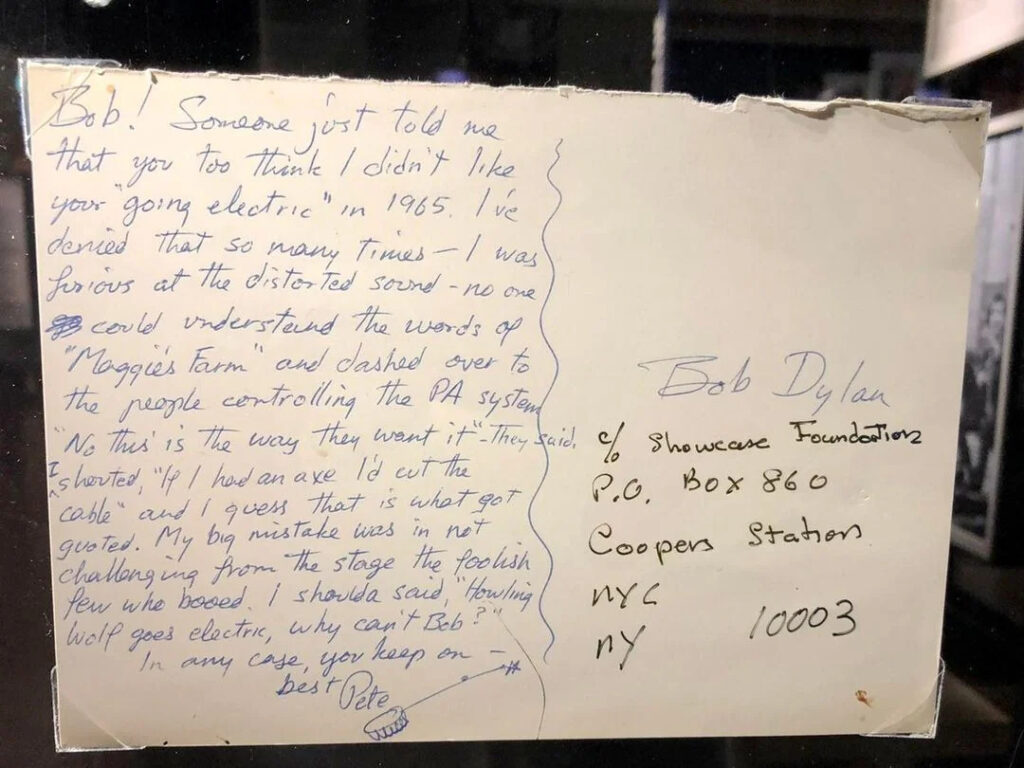Yesterday, in my review of “A Complete Unknown,” I mentioned being blown away by Edward Norton’s performance as folk music legend Pete Seeger (watch as he and Timothée Chalamet as Bob Dylan play and sing in the clip above).
I always felt a connection to Pete because I was raised on his music by my mother, who sat just a few feet away while he and others performed in impromptu hootenannies in people’s New York City apartments in the 1940s, often passing the hat to raise money to pay the rent.
I saw Pete perform at rallies I attended against the Vietnam War in Washington, DC. I saw him perform “Waist Deep In The Big Muddy” in 1968 on the Smothers Brothers’ show after CBS censors tried to keep him off the air. I heard him sing to raise money for the Sloop Clearwater, a project he started to try to clean up the Hudson River. I heard him sing pro-labor songs that stretched back decades into the struggle for America’s working men and women to be treated and paid fairly by their employers. I admired the fact that he was held in contempt of Congress for refusing to name names in the McCarthyism era — when Congress itself was more contemptible than it is now, as hard as that is to believe.
In our apartment, we often sang Pete’s songs, and when I took guitar lessons beginning at age 8, many of the first songs I learned were his. I was thrilled when my daughter was old enough to sing along with “Goodnight, Irene” and “Tzena Tzena Tzena” as we watched “Wasn’t That A Time,” the documentary about The Weavers, the folk quartet made up of Pete, Lee Hays, Ronnie Gilbert, and Fred Hellerman.
There’s a sequence in “A Complete Unknown” of Pete doing his TV show “Rainbow Quest,” which aired in 1964-65 on WNJU, an educational station in New Jersey. On it, Pete played and sang, told stories, and had guests including Johnny Cash and June Carter, Donovan, Judy Collins, and Leadbelly. In the movie, there’s an episode where Pete welcomes a blues singer/guitarist from Mississippi named Jesse Moffette (Big Bill Morganfield). Dylan, who was supposed to be Pete’s main guest, shows up late and sits down to do a song with Moffette.
I’ve looked through all 39 episodes of “Rainbow Quest” on YouTube and there is no record of Dylan appearing on the show — and Moffette was made up, too! It’s one of several things the movie’s director, James Mangold, included that never happened, but I’m willing to chalk them up to artistic license.
Pete’s music and influence have and will continue for generations. In my family, they extend from my mother teaching his songs to me and my brother as very small boys. Songs we then taught to our children. The arc of Pete’s influence flowed not just through his audiences but through other singers and songwriters, from Bob Dylan to John Mellencamp to Bruce Springsteen, who joined Pete in singing Woody Guthrie’s “This Land Is Your Land” at the Lincoln Memorial on the eve of Barack Obama’s inauguration.
That day, as he had thousands of times before, Pete got the crowd to sing along. The joy of singing with others is a big part of Pete’s legacy, but so is his social activism. Pete was always ready to raise his voice against injustice.
Warning: spoiler ahead!
The climactic scene of “A Complete Unknown” takes place at the 1965 Newport Folk Festival, where Dylan shocked the crowd and upset the organizers (including Seeger, Alan Lomax, Theodore Bikel, and Peter Yarrow of Peter, Paul, and Mary) by going electric, which was frowned upon by denizens of the folk music world at the time. They were shouting at Dylan during the band’s soundcheck that afternoon, but he just instructed the musicians to play louder.
When Dylan and his band began playing that evening — still loud — Pete was so upset he tried to get the sound board guy to turn the volume down and considered ending Dylan’s performance prematurely. The movie shows Pete about to take an axe to the equipment cables before his wife Toshi stopped him. There are conflicting reports about whether that actually occurred, but in the 1990s, Pete wrote an explanation to Bob on a postcard:

